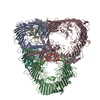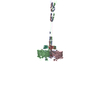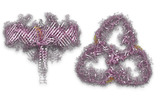+ Open data
Open data
- Basic information
Basic information
| Entry |  | |||||||||
|---|---|---|---|---|---|---|---|---|---|---|
| Title | SDBC and SOD assembly, composite map | |||||||||
 Map data Map data | Composite map | |||||||||
 Sample Sample |
| |||||||||
| Biological species |   Deinococcus radiodurans R1 (radioresistant) Deinococcus radiodurans R1 (radioresistant) | |||||||||
| Method |  single particle reconstruction / single particle reconstruction /  cryo EM / Resolution: 3.5 Å cryo EM / Resolution: 3.5 Å | |||||||||
 Authors Authors | Farci D / Piano D | |||||||||
| Funding support |  Poland, 1 items Poland, 1 items
| |||||||||
 Citation Citation |  Journal: J Biol Chem / Year: 2023 Journal: J Biol Chem / Year: 2023Title: The SDBC is active in quenching oxidative conditions and bridges the cell envelope layers in Deinococcus radiodurans. Authors: Domenica Farci / André T Graça / Luca Iesu / Daniele de Sanctis / Dario Piano /    Abstract: Deinococcus radiodurans is known for its remarkable ability to withstand harsh stressful conditions. The outermost layer of its cell envelope is a proteinaceous coat, the S-layer, essential for ...Deinococcus radiodurans is known for its remarkable ability to withstand harsh stressful conditions. The outermost layer of its cell envelope is a proteinaceous coat, the S-layer, essential for resistance to and interactions with the environment. The S-layer Deinoxanthin-binding complex (SDBC), one of the main units of the characteristic multilayered cell envelope of this bacterium, protects against environmental stressors and allows exchanges with the environment. So far, specific regions of this complex, the collar and the stalk, remained unassigned. Here, these regions are resolved by cryo-EM and locally refined. The resulting 3D map shows that the collar region of this multiprotein complex is a trimer of the protein DR_0644, a Cu-only superoxide dismutase (SOD) identified here to be efficient in quenching reactive oxygen species. The same data also showed that the stalk region consists of a coiled coil that extends into the cell envelope for ∼280 Å, reaching the inner membrane. Finally, the orientation and localization of the complex are defined by in situ cryo-electron crystallography. The structural organization of the SDBC couples fundamental UV antenna properties with the presence of a Cu-only SOD, showing here coexisting photoprotective and chemoprotective functions. These features suggests how the SDBC and similar protein complexes, might have played a primary role as evolutive templates for the origin of photoautotrophic processes by combining primary protective needs with more independent energetic strategies. | |||||||||
| History |
|
- Structure visualization
Structure visualization
| Supplemental images |
|---|
- Downloads & links
Downloads & links
-EMDB archive
| Map data |  emd_15487.map.gz emd_15487.map.gz | 483.6 MB |  EMDB map data format EMDB map data format | |
|---|---|---|---|---|
| Header (meta data) |  emd-15487-v30.xml emd-15487-v30.xml emd-15487.xml emd-15487.xml | 9.3 KB 9.3 KB | Display Display |  EMDB header EMDB header |
| Images |  emd_15487.png emd_15487.png | 15.6 KB | ||
| Archive directory |  http://ftp.pdbj.org/pub/emdb/structures/EMD-15487 http://ftp.pdbj.org/pub/emdb/structures/EMD-15487 ftp://ftp.pdbj.org/pub/emdb/structures/EMD-15487 ftp://ftp.pdbj.org/pub/emdb/structures/EMD-15487 | HTTPS FTP |
-Related structure data
- Links
Links
| EMDB pages |  EMDB (EBI/PDBe) / EMDB (EBI/PDBe) /  EMDataResource EMDataResource |
|---|
- Map
Map
| File |  Download / File: emd_15487.map.gz / Format: CCP4 / Size: 1.1 GB / Type: IMAGE STORED AS FLOATING POINT NUMBER (4 BYTES) Download / File: emd_15487.map.gz / Format: CCP4 / Size: 1.1 GB / Type: IMAGE STORED AS FLOATING POINT NUMBER (4 BYTES) | ||||||||||||||||||||
|---|---|---|---|---|---|---|---|---|---|---|---|---|---|---|---|---|---|---|---|---|---|
| Annotation | Composite map | ||||||||||||||||||||
| Voxel size | X=Y=Z: 0.818 Å | ||||||||||||||||||||
| Density |
| ||||||||||||||||||||
| Symmetry | Space group: 1 | ||||||||||||||||||||
| Details | EMDB XML:
|
-Supplemental data
- Sample components
Sample components
-Entire : SDBC and SOD assembly, composite map
| Entire | Name: SDBC and SOD assembly, composite map |
|---|---|
| Components |
|
-Supramolecule #1: SDBC and SOD assembly, composite map
| Supramolecule | Name: SDBC and SOD assembly, composite map / type: complex / ID: 1 / Chimera: Yes / Parent: 0 / Macromolecule list: #1 Details: This map is a composite map of the maps with deposition codes EMD-15382 and EMD-15384, and it is the composite map for the model with deposition code PDB-8AGD. The map has to be used as a ...Details: This map is a composite map of the maps with deposition codes EMD-15382 and EMD-15384, and it is the composite map for the model with deposition code PDB-8AGD. The map has to be used as a consensus map of the full structure (PDB-8AGD). |
|---|---|
| Source (natural) | Organism:   Deinococcus radiodurans R1 (radioresistant) Deinococcus radiodurans R1 (radioresistant) |
| Molecular weight | Theoretical: 800 KDa |
-Experimental details
-Structure determination
| Method |  cryo EM cryo EM |
|---|---|
 Processing Processing |  single particle reconstruction single particle reconstruction |
| Aggregation state | particle |
- Sample preparation
Sample preparation
| Buffer | pH: 7.4 |
|---|---|
| Vitrification | Cryogen name: ETHANE / Instrument: FEI VITROBOT MARK IV |
- Electron microscopy
Electron microscopy
| Microscope | FEI TITAN KRIOS |
|---|---|
| Electron beam | Acceleration voltage: 300 kV / Electron source:  FIELD EMISSION GUN FIELD EMISSION GUN |
| Electron optics | Illumination mode: SPOT SCAN / Imaging mode: BRIGHT FIELD Bright-field microscopy / Nominal defocus max: 1.0 µm / Nominal defocus min: 0.5 µm Bright-field microscopy / Nominal defocus max: 1.0 µm / Nominal defocus min: 0.5 µm |
| Image recording | Film or detector model: GATAN K2 QUANTUM (4k x 4k) / Average electron dose: 1.3 e/Å2 |
| Experimental equipment |  Model: Titan Krios / Image courtesy: FEI Company |
- Image processing
Image processing
| Initial angle assignment | Type: MAXIMUM LIKELIHOOD |
|---|---|
| Final angle assignment | Type: MAXIMUM LIKELIHOOD |
| Final reconstruction | Resolution.type: BY AUTHOR / Resolution: 3.5 Å / Resolution method: FSC 0.143 CUT-OFF Details: This map is a composite map of the maps with deposition codes EMD-15382 and EMD-15384, and it is the composite map for the model with deposition code PDB-8AGD. This map is a composite map of ...Details: This map is a composite map of the maps with deposition codes EMD-15382 and EMD-15384, and it is the composite map for the model with deposition code PDB-8AGD. This map is a composite map of the maps with deposition codes EMD-15382 and EMD-15384, and it is the composite map for the model with deposition code PDB-8AGD. The map has to be used as a consensus map of the full structure (PDB-8AGD). Number images used: 252122 |
 Movie
Movie Controller
Controller










